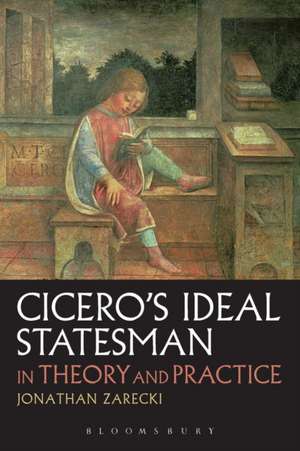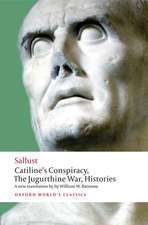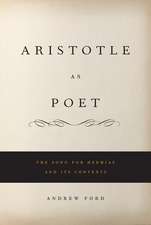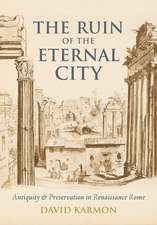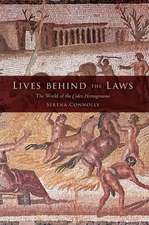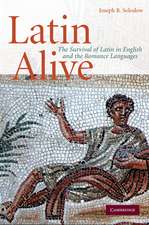Cicero's Ideal Statesman in Theory and Practice
Autor Jonathan Zareckien Limba Engleză Paperback – 21 oct 2015
| Toate formatele și edițiile | Preț | Express |
|---|---|---|
| Paperback (1) | 256.67 lei 6-8 săpt. | |
| Bloomsbury Publishing – 21 oct 2015 | 256.67 lei 6-8 săpt. | |
| Hardback (1) | 714.84 lei 6-8 săpt. | |
| Bloomsbury Publishing – 9 apr 2014 | 714.84 lei 6-8 săpt. |
Preț: 256.67 lei
Preț vechi: 294.97 lei
-13% Nou
Puncte Express: 385
Preț estimativ în valută:
49.13€ • 53.38$ • 41.30£
49.13€ • 53.38$ • 41.30£
Carte tipărită la comandă
Livrare economică 21 aprilie-05 mai
Preluare comenzi: 021 569.72.76
Specificații
ISBN-13: 9781474261883
ISBN-10: 1474261884
Pagini: 224
Dimensiuni: 156 x 234 x 25 mm
Greutate: 0.32 kg
Editura: Bloomsbury Publishing
Colecția Bloomsbury Academic
Locul publicării:London, United Kingdom
ISBN-10: 1474261884
Pagini: 224
Dimensiuni: 156 x 234 x 25 mm
Greutate: 0.32 kg
Editura: Bloomsbury Publishing
Colecția Bloomsbury Academic
Locul publicării:London, United Kingdom
Caracteristici
Cicero, one of the most important figures in Roman politics of the Late Republic, was also renowned for his philosophical and political treatises
Notă biografică
Jonathan Zarecki is Assistant Professor of Classics at the University of North Carolina at Greensboro, USA.
Cuprins
Introduction 1. Academic scepticism and cicero's political theory 2. Cicero's Philosophical politics3. De Re Publica and the Outbreak of Civil War4. Rex Caesar and the Rector-Ideal5. The Ultimate Failure of the Rector-IdealEpilogueBibliographyIndex LocorumGeneral Index
Recenzii
While his thesis may not convince every analyst of Cicero's works, Zarecki has done a first-rate job at exploring the motives and passions of Cicero, who resolved to live with dignity under what he believed to the tyranny of Julius Caesar. I found his case well-put and compelling.
On the whole, Zarecki offers an important and timely reconsideration of a shadowy and ill-understood figure. ... His book makes a persuasive case that a greater degree of continuity existed between the articulation of this ideal and Cicero's political analyses and activities in the 40's than has generally been acknowledged hitherto.
The last twenty years or so have seen a sustained and renewed interest in Cicero's political thought . Zarecki's book is an interesting, thought-provoking, and refreshing contribution to this trend of studies . The book is very clearly written, its exposition is linear, and the development of the argument is repeatedly signposted throughout the work. This is one of the aspects, coupled with narrative accounts, which makes the book very accessible also to advanced undergraduate students . much here will be of relevance for those interested not only in Cicero's political thought, but also in the political events that punctuated the end of the Roman Republic.
Neglected for the 20th century, Roman political thought has seen a recent resurgence of scholarly interest, with classicists, political theorists, and philosophers contributing to a cross disciplinary conversation. Cicero has been of particular importance to this renaissance, and Zarecki has added an important contribution to this scholarship in his original book . Zarecki's book has many virtues: it takes seriously the challenge of interpreting Cicero's writings across distinct genres. The outcome is valuable partly because it avoids the generic constraints on a thinker who's project transcends genre, and partly because it presents a holistic portrait of an individual who is both theorist and practitioner.
A fascinating study of the intellectual journey made by someone who was a top barrister, a leading philosopher and a senior politician in the last years of the Roman republic ... The book will appeal to anyone who has an interest in political theory.
Zarecki's bold position on Cicero's continuous engagement with the figure of the rector rei publicae will interest all Ciceronian scholars.
Zarecki has produced an interesting study with an innovative approach, that offers an informative overview of Cicero's ideal statesman.
An altogether worth reading book in which the well-understandable, refreshingly clear style and the stringent argumentation should be emphasized.
On the whole, Zarecki offers an important and timely reconsideration of a shadowy and ill-understood figure. ... His book makes a persuasive case that a greater degree of continuity existed between the articulation of this ideal and Cicero's political analyses and activities in the 40's than has generally been acknowledged hitherto.
The last twenty years or so have seen a sustained and renewed interest in Cicero's political thought . Zarecki's book is an interesting, thought-provoking, and refreshing contribution to this trend of studies . The book is very clearly written, its exposition is linear, and the development of the argument is repeatedly signposted throughout the work. This is one of the aspects, coupled with narrative accounts, which makes the book very accessible also to advanced undergraduate students . much here will be of relevance for those interested not only in Cicero's political thought, but also in the political events that punctuated the end of the Roman Republic.
Neglected for the 20th century, Roman political thought has seen a recent resurgence of scholarly interest, with classicists, political theorists, and philosophers contributing to a cross disciplinary conversation. Cicero has been of particular importance to this renaissance, and Zarecki has added an important contribution to this scholarship in his original book . Zarecki's book has many virtues: it takes seriously the challenge of interpreting Cicero's writings across distinct genres. The outcome is valuable partly because it avoids the generic constraints on a thinker who's project transcends genre, and partly because it presents a holistic portrait of an individual who is both theorist and practitioner.
A fascinating study of the intellectual journey made by someone who was a top barrister, a leading philosopher and a senior politician in the last years of the Roman republic ... The book will appeal to anyone who has an interest in political theory.
Zarecki's bold position on Cicero's continuous engagement with the figure of the rector rei publicae will interest all Ciceronian scholars.
Zarecki has produced an interesting study with an innovative approach, that offers an informative overview of Cicero's ideal statesman.
An altogether worth reading book in which the well-understandable, refreshingly clear style and the stringent argumentation should be emphasized.
